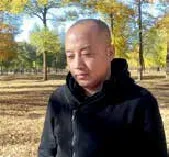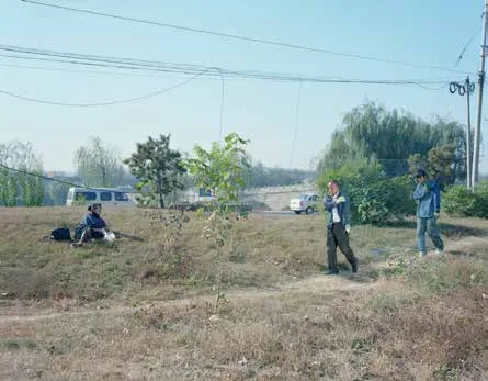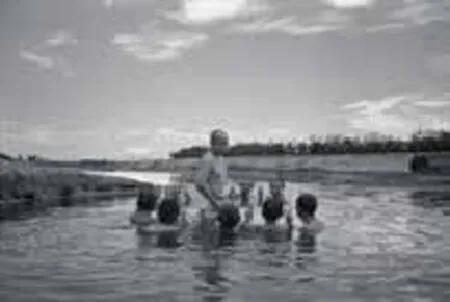POWER, DESIRE, AND VIOLENCE
2014-02-27
POWER, DESIRE, AND VIOLENCE

On-site, 2009
A mirror is present in many of your works, what is the signif i cance of that?
Putting a mirror in a work adds an additional space. For example, when you are shooting scenery, a mirror allows you to shoot both the scenery and yourself. However, it still doesn't offer the full perspective; what's behind you still wouldn't be in the frame.
And you taped actual mirrors to the back of certain photos. Why is that?
One is a crowd watching over the excavation pit, which is turned into a mirror. The idea is to intervene in the process of voyeurism. When we view a picture, we only see a picture. Nowadays, the amount of images has exponentially increased, everyone is creating images. I think that perhaps creating photos itself has lost signif i cance, but intervening in the process of traditional viewing is still signif i cant. My works have always discussed what's behind photography and photography itself, why we spectate, why we photograph, the hidden issues of power, desire, and violence. When I created “The Evasion of Light”, it was during a big crackdown on prostitution. I recreated the scene of police busting a KTV, the violence of which is very similar to the violence of photography.
What kind of desire are you referring to?
The desire to reproduce. Nobuyoshi Araki expressed it very frankly: the camera is essentially a sexual organ.When I shoot, I set myself aside while photographing the scene. Always keep a distance from the act. To be a true photographer, one has to be conscious of the act of taking photos. When taking a photo, one needs to realize the conduct of this act and not be taken over by this tool. Many photographers don't fully devote themselves to the process, which is why I don't think they count as artists.

Cai Weidong (蔡卫东)
Cai Weidong, a Beijing-based artist who mainly works in the medium of photography, is often referred to as one of the leading fi gures in China's “conceptual photography” scene. He doesn't explore photography as art, but rather photography as a medium of art and the inherent qualities of photography itself: the violence, power, and desires born to this medium. His representative works include “Nine-Squared Pattern Drawing” (2008), the“Mirror” series, “The 8th of the 12th” (2008), and “The Evasion of Light” (2009). He doesn't consider himself a photographer, rather a “producer and editor of images”.

Transporting, 2009

Mirror II, 2005
Why do you only shoot “staged” photographs?
I don't believe in documentary photography. All photos are designed and staged. The moment you start to believe the reality in photos, reality leaves you. Aesthetically and when expressing thoughts, it is okay. Otherwise, the point of photography is only to make this capitalist and materialistic world more false.
What are your thoughts on digital photography, mobile phone photography, and this era where everyone is a photographer?
I do not agree with the concept of photography; rather, it is the producing and editing of imagery. Everyone is a photographer; everyone is born to be a photographer. In order to be considered art, the most important ability of a photographer is not to photograph, but the ability to edit and process imagery to show your own concepts. When you take a photograph, you reproduce a reality, but at the same time, you are pushing reality away. In the process of reproducing realities, you'd be constantly pushing the reality away. More and more people are becoming obsessed with taking photos. Like when you see a beautiful girl, you want to photograph her. But the beautiful girl has nothing to do with that reproduced reality. Why not just enjoy her presence? The photo would be unnecessary, the so-called “reality” is the now, why push it away and savor the reproduced reality later? -WEIJING ZHU(祝伟婧)
